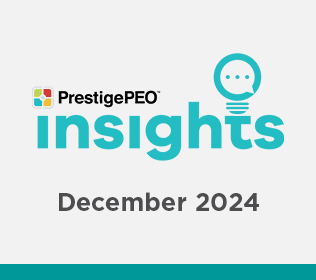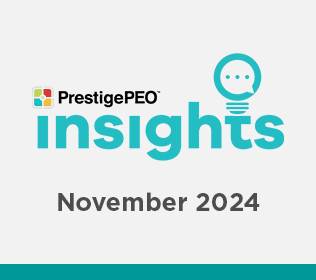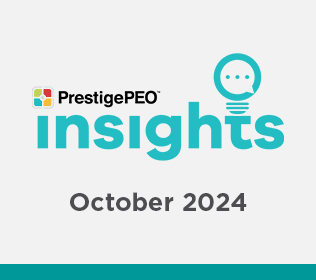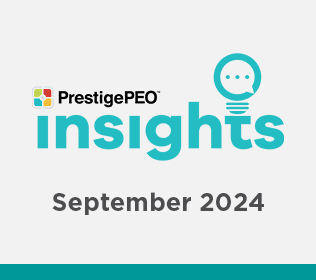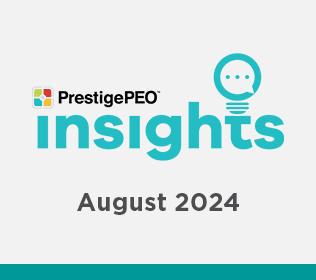
The latest news relevant to you and your business
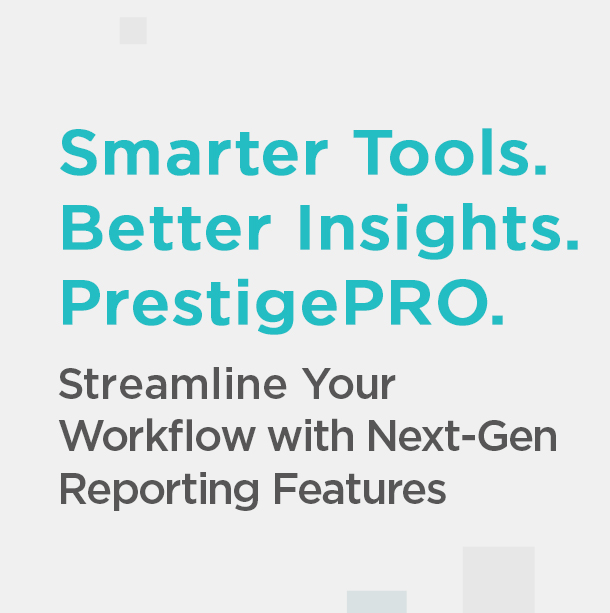
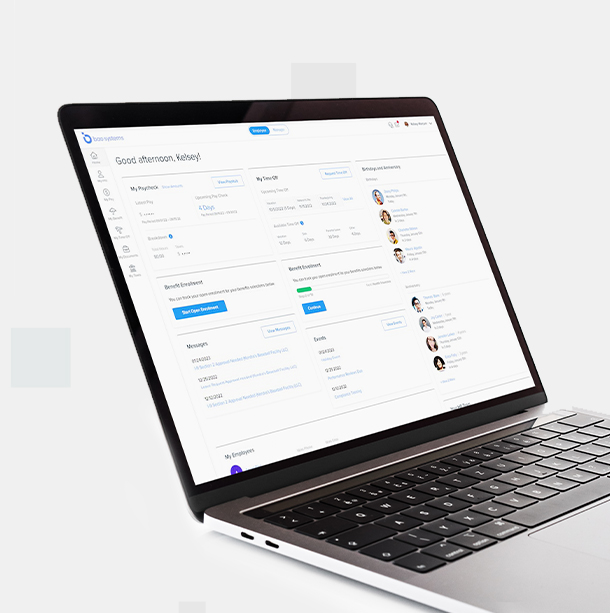
Take Control of Your Data with PrestigePRO
We’re thrilled to share that PrestigePRO’s Reporting Center is fully upgraded and ready to transform your data experience! With enhanced dashboards, advanced report-building options, and cutting-edge visualizations, managing and analyzing HR data has never been easier.
Here’s what you can expect:
- Clearer, more intuitive views of key data.
- Build, save, and schedule customized reports effortlessly.
- Turn complex data into actionable insights with ease.
Take control of your data today and experience the full power of PrestigePRO’s Reporting Center.
Join us on Wednesday, February 12, 2025, for an engaging and informative webinar designed to help you make the most of your Healthcare Spending Accounts (HSA), FSA, and Dependent Care FSA plans.
Here’s what you’ll learn:
- The key differences between FSAs, HSAs, and Dependent Care FSAs.
- Tips for filing claims and utilizing your plans effectively.
- Important 2025 dates and deadlines to keep in mind.
Don’t miss this opportunity to get your questions answered and ensure you’re making the most of these valuable benefits.

Simplify Expense Reporting with ExpensePath
Take the hassle out of managing expenses with ExpensePath, a powerful solution that integrates expense reporting and payroll seamlessly. ExpensePath transforms expense management by streamlining submissions, reviews, approvals, and reimbursements—all while improving accuracy and saving time.

PrestigeGO Mobile App: HR in Your Pocket
With PrestigeGO, managing HR is as easy as a few taps on your phone. Whether you’re an employee or a manager, this app provides seamless access to payroll, employee benefits, time-off requests, and direct communication with your dedicated HR specialists. Available for iPhone and Android, PrestigeGO offers a secure and user-friendly experience that keeps your HR essentials at your fingertips—anytime, anywhere.

In Case You Missed It: Essential Compliance Insights for the Northeast Region
Our recent webinar offered updates on federal and state regulations, key case law developments, and compliance trends shaping the Northeast. These insights are essential to keeping your business compliant and ready to tackle the year ahead.

Secure Your Spot: West Coast Employment Law Update 2025
Stay informed on critical legislative updates and workplace trends in California, Oregon, and Washington. Join us on Wednesday, January 29, 2025, at 2:00 PM EST for a live webinar with PrestigePEO’s compliance experts. Learn about new laws, key case law developments, and emerging employment trends to keep your business compliant and ahead in 2025.

Critical Compliance Updates Every Business Should Know
New Year Reminder: Time to Review Your Labor Law Posters
As the new year begins, it is a good time to review your labor law worksite posters. These posters are an important and useful resource to inform you and your employees of workplace rights. We want to remind you to review these posters often, as they are updated frequently. These posters are located in high-traffic areas, like a lunchroom or kitchen in your office.
In addition to worksite posters, if you are or have work-from-home or telecommuter employees, you should receive digital posters via email from compliance@prestigepeo.com every time there is an update.
For your convenience, all poster copies are accessible on the PrestigePRO employee portal.
- Log in to PrestigePRO and locate “State Posting Notices” on the left-hand side of the screen.
- Once there, the dropdown box will ask you to click on your state.
- After clicking on your state, you will see an additional dropdown box where you can click on the individual federal, state, and local postings that may be applicable. You can view them as you wish.
If you have any questions regarding poster compliance, please reach out to your PrestigePEO HR Business Partner.
Colorado’s New Privacy Rules: What Employers Need to Know
In early December 2024, Colorado’s Attorney General’s office adopted changes to the existing Colorado Privacy Act (CPA) that will require updated compliance requirements beginning July 1, 2025. While Colorado’s Department of Law awaits the Colorado Attorney General to formally sign off on the final draft of the new rules, the effective dates are anticipated to remain in place. These new rules relate to the collection and use of employee biometric data under the parameters of Colorado’s privacy laws, as well as protections for children’s personal data.
There are three major changes that all businesses and employers are advised to become familiar with and learn to manage regarding Colorado’s privacy laws in the New Year. The first major change includes the new rigorous notice and consent obligations that all entities that collect biometric data must follow. Biometric data includes fingerprints, voiceprints, retina or iris scans, facial mapping, facial geometry, facial templates, and the like. Effective July 1, 2025, all businesses and employers that collect this type of personal data for the purposes of using it for unique identification must now provide biometric identifier notice that places the individual on notice prior to collection of the biometric identifiers, notifying that individual as to what data is being collected, why it is needed, how long it will be retained, and whether or not it will be shared. This required notice can be provided as a part of broader privacy notices, or as a separate, singular policy. Either way, the policy needs to be clearly labeled and must be formally acknowledged as received and accepted by the recipient. All Colorado employers will be required to obtain either written or electronic consent from employees before collecting their biometric data AND updated consent must be obtained if the data will be utilized for a new, previously unidentified purposes or involves additional types of biometric identifiers.
Effective October 1, 2025, all entities that offer online services, products, or features to children must obtain parental or guardian consent before processing any minor’s data; conduct data protection assessments for any features designed to significantly increase minors’ use of a product or services; and limit the duration of data retention and avoid using system design features to manipulate minors’ engagement.
With these new rules comes a new opportunity for businesses and employers to gain clarity from the Attorney General regarding compliance obligations by requesting opinion letters and interpretive guidance that can then be used as a “good faith reliance defense” in the future, should an organization be presented with data privacy violation claims. Unlike in the past, these interpretive opinion letters can be relied upon and used by all entities, not just the businesses that originally requested the guidance.
In addition to becoming familiar with these new requirements, employers and businesses are encouraged to begin preparing now for the upcoming changes by conducting an internal audit of privacy data collection and use practices to determine the extent of biometric data collection within an organization and how compliance with the new rules will be achieved. They should also identify current privacy notices and update them to comply with the rigorous notice and consent obligations under the new rules. Education and proper training of employees who manage employee biometric data will also be critical for obtaining and ensuring compliance. Employers are also encouraged to engage in the available opinion letter option, as provided by the Attorney General’s office, for gaining clarity on matters that may present compliance challenges.
PrestigePEO is here to help. If you have any questions or need further support navigating the new Colorado privacy data regulations, please contact your HRBP. We are here to help.
Illinois amends the Human Rights Act to include Claims of Discrimination Against Family Caregivers
In a progressive move, Illinois Governor JB Pritzker signed House Bill 2161, amending the Illinois Human Rights Act, to include “family responsibilities” in the list of protected classes providing freedom from discrimination in employment. This new requirement prohibits discrimination against an individual because of their family responsibilities and took effect on January 1, 2025.
Family responsibilities are defined as an individual’s actual or perceived provision of personal care to a family member. Family member is defined as “an employee’s child, stepchild, spouse, domestic partner, sibling, parent, mother-in-law, father-in-law, grandchild, grandparent, or stepparent.” The family member definitions relate back to the same terms as they are defined in the Illinois Employee Sick Leave Act and the protections afforded under that Act.
The new amendments to the Illinois Human Rights Act now makes it a civil rights violation for “1) an employer to refuse to hire, to segregate, to engage in harassment, or to act with respect to recruitment, hiring, promotion, renewal of employment, selection for training or apprenticeship, discharge, discipline, tenure or terms, privileges or conditions of employment on the bases of family responsibilities; 2) any employment agency to fail or refuse to classify properly, accept applications and register for employment referral or apprenticeship referral, refer for employment, or refer for apprenticeship on the basis of family responsibilities; and 3) any labor organization to limit, segregate, or classify its membership, or to limit employment opportunities, selection and training for apprenticeship in any trade or craft, or otherwise to take or fail to take, any action which affects adversely any person’s status as an employee or as an applicant for employment or as an apprentice, or as an applicant for apprenticeships, or wages, tenure, hours of employment, or apprenticeship conditions on the basis of family responsibilities.”
Furthermore, it is also a civil rights violation to conspire to retaliate against a person because they have opposed any behavior or actions which they reasonably and in good faith believe to be discrimination based on family responsibilities.
Law makers were clear to preclude any necessary requirements or obligations on the employer’s behalf from having to accommodate or modify reasonable workplace rules or polices for an employee, based on family responsibilities related to leave, scheduling, productivity, attendance, absenteeism, timeliness, work performance, as long as its rules or policies are applied in accordance with this new law. Employers are encouraged to review their anti-discrimination policies and update them accordingly.
PrestigePEO is here to help. For guidance on this new regulation or any other questions, please contact your HRBP for help.
Changes to Minnesota Regulations for the New Year
Drug and Alcohol Testing in the Workplace Act Amendment
There are a number of new regulations taking shape in Minnesota for 2025. The first involves the state’s Drug and Alcohol Testing in the Workplace Act. The Minnesota legislature has revised the Drug and Alcohol Testing in the Workplace Act to now allow for “oral fluid testing” for drug, alcohol, and cannabis testing. Oral fluid testing is the analysis of a saliva sample for the purposes of detecting and measuring the presence of drugs, alcohol, and/or cannabis substances. This testing is required to conform with all current state drug testing standards and all currently imposed requirements will now apply equally to any oral fluid testing the employer uses. The statue further reads that an employer may not request or require an employee or job applicant to undergo drug and alcohol testing on an arbitrary and capricious basis. This amendment went into effect on January 1, 2025.
Pay Transparency Requirements
The Minnesota legislature has also passed pay transparency regulations, effective January 1, 2025, thereby joining the growing list of states to pass statewide requirements. This new law requires employers with thirty or more employees to include the starting salary range as well as a general description of all benefits, including available health or retirement benefits, and other compensation a potential employee can expect, in all job postings. The salary range requirement is defined as the minimum and maximum annual salary or hourly range of compensation an applicant can expect and prohibits an open-ended salary range. If a salary range is not available, the employer must post a fixed pay rate.
Job postings are defined as any electronic or printed posting intended to solicit interest in a specific job position, and includes postings generated directly by the employer or indirectly by a third party.
These provisions apply to employers with thirty or more employees at one or more locations within Minnesota, which differs from other states’ transparency laws. Penalties and enforcement provisions have not yet been defined; however, individuals can generally bring a claim of violation of the new pay transparency law to the Minnesota Department of Labor and Industry or the Attorney General. Prestige PEO will continue to monitor these developments.
City of St. Paul Requirements
The city of St. Paul, Minnesota has also initiated several employment related requirements for the New Year. These include the Employee Notice requirement that all employers with 1 or more employee(s) in St. Paul must now provide all new employees with a notice of their employment rights under the St. Paul wage theft ordinance, both at hire and annually thereafter. The notice must contain information including the employee’s start date, notice of the city’s minimum wage amount, a statement related to the sharing of tipped compensation, any related overtime requirements as per the employer’s policies, as well as all information required by Minn. Stat. §181.032(d). Employees will be required to sign and return the Notice to their employer who must retain the copy for three years after the termination of that employee’s employment. A notice of employee’s rights under this wage theft ordinance will also need to be included in the employer’s handbook. Furthermore, employers need to post the city’s wage theft flyer in a location on-site where all employees will have access to and be able to view the posting.
Additionally, as of the first of the year, employers in St. Paul will also need to provide all employees their pay stubs each pay period. The pay stub may be provided electronically; however, if a physical copy is requested, one must be provided if requested by the employee at least 24 hours in advance.
PrestigePEO is here to help. For guidance on these new regulations or any other questions, please contact your HRBP for help.
Connecticut Court Provides Clarity on Job Postings and Age Discrimination
The Connecticut Appellate Court recently clarified a key issue for employers concerning job postings. The court ruled in Commission on Human Rights and Opportunities v. Yale University that phrases like “recent college graduate(s)” are not inherently age-discriminatory under Connecticut law.
While this decision reassures employers, it also highlights the importance of neutral language in job advertisements. The court found that “recent college graduate(s)” does not directly express an age preference, but it emphasized that the phrase could contribute to a claim of age discrimination if combined with evidence suggesting a broader discriminatory intent.
Employers should be mindful of Connecticut’s broader anti-discrimination laws, such as Public Act 21-69, which prohibits inquiries about age-related information during the hiring process, such as graduation dates. To promote inclusivity, employers should highlight the skills, certifications, and experience required for the role, such as “entry-level role” or “bachelor’s degree required,” rather than referencing age-related information, such as dates of attendance or graduation, unless an exception applies, like safety or legal compliance.
This ruling provides valuable guidance and highlights the importance of focusing on qualifications and inclusivity. Train HR staff and hiring managers to focus on skills and qualifications and avoid exclusionary language.
Contact your PrestigePEO HR business partner if you need help updating your practices or drafting job advertisements.
Florida Off-Duty Medical Marijuana Use Employer Insights
The legal landscape for medical marijuana in Florida continues to evolve, posing challenges for employers. A recent court ruling, Giambrone v. Hillsborough County, underscores the need for employers to carefully navigate state and federal laws when addressing off-duty use of medical cannabis by employees.
The court held that off-duty use tied to an employee’s disability could be protected under the Florida Civil Rights Act. When employees present medical marijuana use tied to a disability, carefully document the request and assess whether a reasonable accommodation is possible under state law. Employers retain the right to prohibit impairment at work and to maintain safety-sensitive roles free of cannabis-related risks.
Employers in Florida should remain proactive and adapt workplace policies to balance compliance with employee rights and workplace safety as it relates to this emerging area of marijuana usage.
If you need help updating your practices or have questions about human resources matters, please get in touch with your PrestigePEO HR Business Partner.
New Hampshire – Guns in the Workplace Parking Lot
On January 1, 2025, House Bill 1336 went into effect in New Hampshire. It allows employees to store their lawfully owned guns and ammunition in their cars while at work, so long as the vehicle is locked and the guns remain out of sight. Employers are not allowed to take adverse action against their employees should an employee elect to keep their lawfully owned guns and ammunition in their vehicle when parked at the workplace.
The new law addresses employers’ concerns regarding the liability of having firearms on workplace property. As such, pursuant to House Bill 1336, “an employer or an agent of an employer may not be held liable in any civil action for any damages for any economic loss, injury, or death resulting from or arising out of another person’s actions involving a firearm or ammunition stored pursuant to this section…”
Next Steps?
Employers with policies prohibiting weapons in the workplace, including the parking area, may want to update their policies to align with the new law. PrestigePEO is here to help when you are ready to make those updates.
New York Anticipated Changes to Non-Compete Laws
As we move into 2025, employers in New York should prepare for potential legislative shifts regarding non-compete agreements. While a proposed federal ban on non-compete agreements was recently blocked, states are increasingly addressing this issue. New York may revisit proposed legislation aimed at significantly limiting the use of non-compete clauses.
In 2023, New York lawmakers passed a bill that sought to restrict non-compete agreements, but Governor Hochul ultimately vetoed it. The primary concerns included the lack of exceptions for the sale of a business and the absence of a salary threshold for applicability. Lawmakers have signaled their intent to reintroduce revised legislation, which could include these provisions. Additionally, New York’s potential changes align with a broader trend, as other states like California, Minnesota, and Colorado have enacted strict limits or outright bans on non-compete clauses. Employers in New York should anticipate that a new bill may closely mirror these existing laws while introducing unique requirements specific to the state.
While the specifics of future legislation remain uncertain, employers can prepare for the potential impacts on their business. To stay ahead of these potential changes, New York employers should take proactive steps, including reviewing existing non-compete clauses in employment and contractor agreements to identify their scope, enforceability, and alignment with existing state laws. Employers can focus on alternative protections, such as robust confidentiality agreements, trade secret protections, and non-solicitation clauses for clients and employees. These restrictions may remain permissible under future legislation. New York employers wanting non-compete agreements should consult legal counsel to ensure compliance with emerging requirements.
With the ongoing state-level push to regulate non-compete agreements, businesses should be prepared for potential changes that could significantly impact their ability to restrict employee mobility. By staying informed and exploring alternative protections, New York employers can safeguard their interests and competitive edge while navigating this evolving legal landscape.
Our PrestigePEO team will continue to monitor the situation and share legal updates affecting your business compliance.
Illinois E-Verify Update: Key Compliance Obligations
Starting January 1, 2025, an amendment to the Illinois Right to Privacy in the Workplace Act will impose significant new obligations on employers using the federal E-Verify system. While E-Verify remains legal in Illinois, this new law introduces strict requirements beyond federal guidelines. Employers must act quickly to comply with these changes and avoid penalties. Key Compliance obligations include mandatory notices and training, prohibited practices, detailed notification and attestation requirements, and employee protections.
Mandatory Notices and Training
- Employers must display federally and state-mandated E-Verify notices prominently in the workplace.
- All E-Verify employees must complete required training, with proof of completion retained for inspection.
Prohibited Practices
- E-Verify cannot be used to pre-screen job candidates or monitor current employees.
- Employers must safeguard sensitive data in E-Verify and prevent unauthorized access.
Detailed Notification and Attestation Requirements
- Employers must meet strict deadlines for filing attestations and notifying employees.
- Employers must file an attestation confirming receipt of training materials, compliance with training, and proper posting of notices within 30 days of enrolling in E-Verify or by January 31, 2025.
- When discrepancies are flagged in an employee’s verification documents, employers must notify the employee within five business days, provide clear guidance for resolving the issue, and outline the employee’s rights.
- Employers must inform all employees within 72 hours of receiving notice of an I-9 inspection. This notice must include the agency conducting the inspection, details of the inspection, and a copy of the notice.
Employee Protections
The law reinforces employee protections, prohibiting retaliation or adverse actions against those who file complaints or contest findings. Employers must ensure all communications about discrepancies or inspections are provided in the employee’s preferred language when possible, including clear timelines, findings details, and the employee’s right to representation.
Practical Steps for Employers
To comply with these new requirements, employers should audit E-Verify practices and review policies to ensure they align with state and federal requirements. They should also avoid practices that misuse the system, ensure all E-Verify users are trained, document certifications, establish procedures to meet notification deadlines and ensure multilingual and detailed communications.
By taking these steps, employers can continue to use E-Verify responsibly while meeting Illinois’s enhanced compliance standards. For additional guidance and templates, visit the Illinois Department of Labor website.
Creating a positive workplace culture is essential for employee engagement, retention, and productivity. From fostering inclusivity to aligning leadership with core values, this guide offers actionable tips to build a supportive environment where your team can thrive. Learn how strategic hiring, transparent communication, and tailored HR solutions from PrestigePEO can transform your organization.
Your connections could earn you rewards! Refer a business owner to PrestigePEO and earn up to $2,500 for every successful referral. It’s a simple way to help fellow business owners discover the benefits of partnering with PrestigePEO while gaining rewards for yourself. Join the growing list of clients who’ve turned referrals into thousands of dollars in rewards.
Don’t wait—start referring today and see the benefits of sharing the PrestigePEO experience!
Feedback
Have ideas for our next newsletter? We’d love to hear from you! Whether it’s suggestions, questions about our services, or program inquiries, our team is here to help.
Email us at marketingteam@prestigepeo.com to share your thoughts or learn more. Let’s collaborate and grow together!



